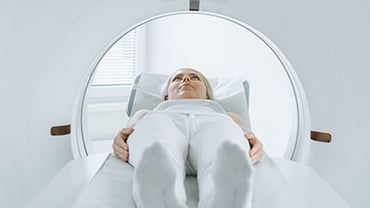MRI-Based AI Can Distinguish Aplastic Anemia From MDS

MONDAY, April 24, 2023 (HealthDay News) -- A magnetic resonance imaging (MRI)-based machine learning method can distinguish aplastic anemia (AA) from myelodysplastic syndromes (MDS), according to a study published online March 6 in Clinical Radiology.
P. Xiang, from The First Affiliated Hospital of Zhejiang Chinese Medical University in Hangzhou,, and colleagues conducted a retrospective study involving patients diagnosed with AA or MDS by pathological bone marrow biopsy who underwent pelvic MRI with the iterative decomposition of water and fat with echo asymmetry and least-squares estimation quantitation (IDEAL-IQ). Three machine learning algorithms, including linear discriminant analysis, logistic regression, and support vector machine (SVM), were used to identify AA and MDS based on values of right ilium fat fraction (FF) and radiomic features extracted from T1-weighted (T1W) and IDEAL-IQ images.
The study included 77 participants (37 men and 40 women), aged 20 to 84 years. Twenty-one patients had MDS and 56 had AA. The researchers found that the ilium FF of patients with AA was significantly greater than that of MDS patients (mean ± standard deviation: 79.23 ± 15.04 versus 42.78 ± 30.09 percent). The IDEAL-IQ-based SVM classifier model had the best predictive ability selecting from the machine learning models based on ilium FF, T1W imaging, and IDEAL-IQ.
"IDEAL-IQ-based machine learning of the pelvis can distinguish AA from MDS with high accuracy, and its predictive ability was significantly better than ilium FF and T1W-based machine learning," the authors write. "The combination of machine learning and IDEAL-IQ technology may enable noninvasive differentiation of AA from MDS."
Abstract/Full Text (subscription or payment may be required)
Related Posts
Two More Brands of Eye Drops Recalled Over Infection Risks
TUESDAY, March 7, 2023 (HealthDay News) -- U.S. federal health officials have...
Health Highlights: May 31, 2022
WHO expert says monkeypox not the next pandemic. Still, it's not clear how the...
Magnets in Portable Electronic Devices May Interfere With CIEDs
TUESDAY, March 1, 2022 (HealthDay News) -- Magnets in portable electronic...
Mejora la cooperación de los estadounidenses con los desconocidos
MARTES, 19 de julio de 2022 (HealthDay News) -- La sociedad estadounidense quizá...
